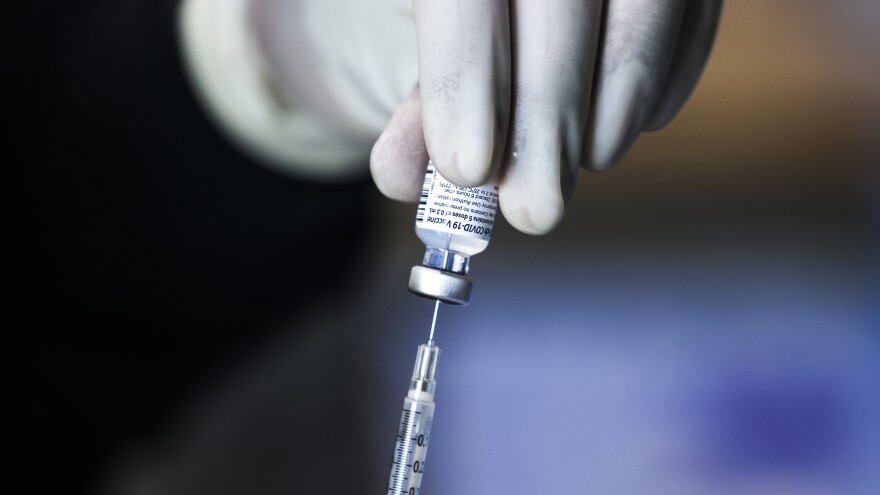More vaccine doses are coming to Florida as more vaccinations take place. But there’s also more confusion about where and how to get them.
The criteria seem to change daily.
Beginning Monday, Florida is lowering the age to qualify for the shot from 60 to 65. Gov. Ron DeSantis suggests it will soon be 55, and that it will be available to the general public as soon as April.
Then, President Joe Biden then said he would direct states to open eligibility to all adults by May 1.
In Florida, more than 4 million people have been vaccinated, so far. But there remains plenty of vaccination confusion. Already, some places are offering shots to people as young as 16 with certain medical conditions. Some locations are going on the honor system, with no proof necessary.
There are more places to get vaccinated, more people getting vaccinated, growing confidence in having the vaccine supply but also confusion and frustration at the places where the doses are being put in arms.
On the "Florida Roundup," host Tom Hudson spoke with reporters from around the state to get a clearer picture of the state’s vaccine rollout.
Here’s an excerpt of the conversation that has been edited for clarity.
TOM HUDSON: Why has there been so much confusion about who is eligible for vaccines at these FEMA sites?
VERÓNICA ZARAGOVIA: Things change so quickly. I was at the Miami Dade College [North Campus] site on Saturday, everything was running smoothly, and then far further south in Florida City, near Homestead, there was a temporary site that is now closed, but it was open for a week. And on that Saturday, they had such a low turnout of people that it seems staff allowed people who didn't meet the qualifications to get vaccinated.
And, of course, the rumors started spreading through social media, and hundreds of people showed up. And that rumor actually lasted through about Wednesday of this week when I was still finding people at Miami Dade College who were showing up thinking that anyone was getting vaccinated.
So what are the rules, and how are they being applied at these sites?
ZARAGOVIA: So the rules are a bit different from the state sites than these federally-supported sites.
You can be a person who is 65 or older, a health care personnel, 18 or older, a person who works in pre-K through 12 education who is 18 or older. And then you can be a person who has an underlying medical condition, 18 and older. And you have to bring a doctor's note. And just to be clear, this is for the three federally-supported sites. And that form can be the Department of Health form — that we have a link to on our site — on your phone or with you or a doctor's note and then everybody else [who is eligible] like the firefighters and police officers, 50 and older.
How are these age-based rules playing out in the Tampa area?
STEPHANIE COLOMBINI: It really depends where you are. As we've talked about, the FEMA federally-supported sites, and some pharmacies like CVS and Walmart involved in federal programs, they're vaccinating people — teachers of all ages K to 12. Hillsborough County has also decided at its county-run sites to do K to 12 teachers of all ages. But then in neighboring counties, you have people following those state rules and at state-run sites where it's got to be 50 plus. So you really have to do your research.
Hudson: There are three vaccination sites that are FEMA supplied in Jacksonville. How are they operating in terms of demand?
KELLY WILEY: The sites here locally in Jacksonville are similar to what you're hearing in other places and what we've heard on your show today. They're not that busy. In the beginning, they had a burst towards the end of the day. But most of the people that came towards the end of the day were actually not eligible under the governor's executive order or through the federal directive for school teachers at the time.
A lot of them were not even 50 but they were being turned away because they weren't eligible. There's not much of a line but a lot of people are being turned away. As far as numbers since the site opened, to yesterday, the last full day they've been able to do, I think, 32,000 doses. That's their capability.
What do the racial distributions look like of these vaccinations that are happening in Florida?
CHABELI CARRAZANA: We are seeing white people, by and large, are receiving vaccines at a much higher rate, even though these sites are supposed to be in areas where minority communities are able to access them a little bit more. And the reality is we are starting to see that pick up here in Orlando.
I was at the [FEMA] site recently, and it was located very, very close to a majority Black and Latinx neighborhood. And so a lot of the folks I spoke to said if this wasn't here, I don't think I would have come to get my vaccine. I wouldn’t have gone across town, and there were other aspects to it.
There was no appointment necessary. If your transportation is an issue, you can get a ride at any time and show up. It was moving fairly quickly. And so location, in the sense of these FEMA sites, is really critical to be able to bridge that gap that is still there in terms of communities of color.
Copyright 2021 WLRN 91.3 FM. To see more, visit WLRN 91.3 FM.


